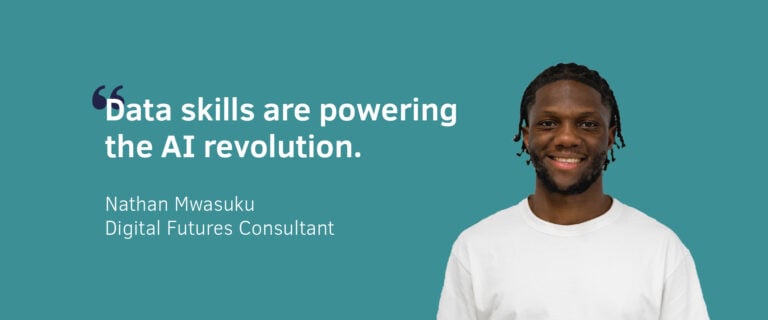We’re all using and providing data on a daily basis, whether we realise it or not.
Because of this, the importance of increasing overall data literacy is more apparent. But there is a case to be made for altering the way in which we learn the key concepts.
Let’s compare two different approaches.
Imagine you were to gather a large group of people together and thoroughly explain to them what data and data science are, how they function in today’s society, and their workings. You’d likely be met with many confused and perhaps bored faces.
Instead, you could do it the Digital Futures way.
Design a seemingly unrelated game where people from all backgrounds get to meet each other and collect information into a reproducible format. What you then achieve is “unintentional” data collection! Consequently, from the very first day I started training in the Academy, Digital Futures offered the ideal insight into how we can achieve new ways of learning about data.
While I truly believe mathematics to be the most fascinating subject in our world, it is the ultimate “marmite” of subjects. Children either fall in love with it or utterly despise it, based on how receptive they are to the teaching methods. Teach a kid how to use some mathematical tools over and over – they won’t grasp the applicability. Instead, start by relating to things they’re accustomed to: shapes, counting, daily tasks – and suddenly, the objective becomes clearer.
I believe this to be one of the many unique missions of our training at Digital Futures. The focus within the Academy always seems to fall on, “Do we understand the importance of this concept? How is it used? Why?” rather than “Do we understand the inner working of concepts in a traditional framework?”. Perhaps the latter approach would have been suitable some years ago, when data expertise was a niche background that few people attained. However, nowadays, we provide and obtain data constantly in documented, stored, and accessible formats. People need to realise the implications of this step-by-step, and it’s far easier to do so in simpler, more relatable instances.
Indeed, there is no age limit for learning through “games”. In fact, games are thought-provoking, engaging, stimulating and above all, universal. People are naturally more receptive when they’re in a good mood, and this kind of work environment is more than encouraged in our Academy. The sooner everyone adopts this mentality, the quicker we can discuss enhancing data literacy.







